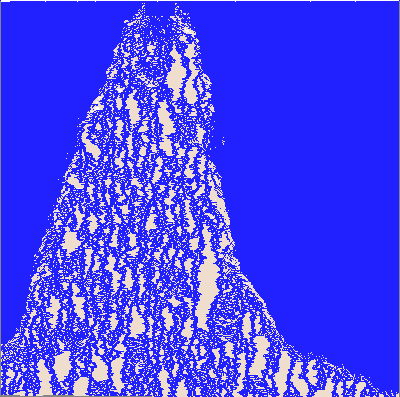There's a fascinating article on The Edge's World Question Center where they ask a big pile of distinguished thinkers about what they believe, but cannot prove. Curiously, right before I came across this article, I was thinking myself about things that I believe but don't have any evidence for - things that I believe simply because believing them makes me happier than not believing them. In the sense that there are some of these things, I suppose I am religious, though not in the traditional "organized religion" sense (I prefer to choose my own beliefs rather than following a pre-packaged set). For your derision I will outline these beliefs here.
I believe that I have free will, that is that there is an irreducible "something" in the universe that is "me" and that is not bound by deterministic laws of physics (i.e. that if it was simulated perfectly on a computer, no matter how much the simulation might act like me it would still not be me). I belive that quantum mechanics may leave room for this sort of dualism.
I believe that we will eventually figure out how to construct a theory of physics that includes both quantum mechanics and gravity as special cases.
I believe that true love is real - that there is more to this feeling than just a chemical reaction in the brain that has evolved to give children a better chance of survival into adulthood by providing them with stable families. (Call me a romantic.)
I also believe that I will live forever. Not in the Christian sense of living forever in heaven - I believe I will live forever in this universe. This is kind of an unusual one, so I feel I should justify it a bit (though I do not pretend for a moment that this constitutes any sort of proof). Suppose for a moment that Everett's many worlds formulation of quantum mechanics is the correct one - i.e. that whenever any fundamental particle could go either one way or another way, the entire universe is effectively "splits" into two universes identical in every respect except that this one particle goes one way in one universe and the other way in the other universe.
Now, suppose one of these choices lead inevitably to my death, while the other choice allowed me to remain alive. From my point of view, the irreducible "me" continues to exist only in one of the universes, so that is the universe that I experience. I cannot experience my own death because (by definition) I am no longer there to experience it once it is complete.
This seems to have worked pretty well so far - there have surely been lots of quantum mechanical events which, if they had turned out in a way differently than the way they did, would have lead to my death. However, that in itself is not very strong evidence since the probability of my death so far has probably been fairly low, quantum-mechanically speaking (if we discount the improbability of my conception in the first place, which I do because I wasn't alive then). Lots of people have survived to my age in my universe, and none of them quantum-mechanically needed to in my universe in the same way that I quantum-mechanically need to in my universe. However, when one day I become the oldest living human being and continue to live for much longer than anyone else has ever done, this line of thought will be more convincing.
That leads to a rather depressing-sounding scenario - I will get to watch everybody that I love die. The only way I get to die is if the universe inevitably gets to a state where no life at all is possible - if it collapses in a "Big Crunch" or expands at an ever accelerating rate leading eventually to all atoms being ripped apart. Which are also rather depressing scenarios in themselves. However, I find these possibilities significantly less depressing than the possibility of dying, so I don't worry about it too much. I'm excited to see what happens!
Believing this behooves me to support certain causes - those which will ensure I continue to be comfortable in the very long term. I want our planet to continue to be a nice place to live. I want the rest of the human race to not become extinct, so that I always have somebody around to talk to. I also want medical technology to continue to improve so that, no matter how many parts of my body start to fall of, I'll always be able to get them stuck back on or replaced so that I can continue to have a good quality of life. With this belief system these worthy causes are also in my personal interest.
Although I can't die I can still suffer a great deal of pain, so this immortality does not excuse me from having to take care not to get into a car accident, and if you say "so you think you're immortal? Prove it by shooting yourself in the head with this gun" I will refuse since the most likely outcome of accepting would be having to live with terrible brain damage.
Despite the depressing sides, this idea holds a certain comfort for me. Not having any limit on my lifespan frees me from thinking "oh I must do this before I die, and this, and this" and getting frustrated that I probably wouldn't be able to achieve them all. There are still lots of things I want to do, but there's no rush as I have plenty of time. It's kind of the opposite of the "live every day as if it was your last" philosophy.
Note that nothing in this theory mentions me by name, so anyone else can apply this theory to themselves just as I can. From your point of view, you will also experience living until the end of the universe, and experience everyone else dying. There is no contradiction here because of the many worlds interpretation of quantum mechanics - you continue to live forever in your universes, I continue to live forever in mine. You die in my universes, and I die in yours. Of course, you might not believe that this is really how things work, but if things do work like this you don't have to believe it for it to happen. Of course, this theory isn't falsifiable - if this theory turns out to be wrong you won't be able to tell me "I told you so", and if it turns out to be right I won't be able to say "I told you so" either (at least to anyone who has been born already).
While checking the links in this post, I discovered that apparently I am not the first person to have thought of this.




